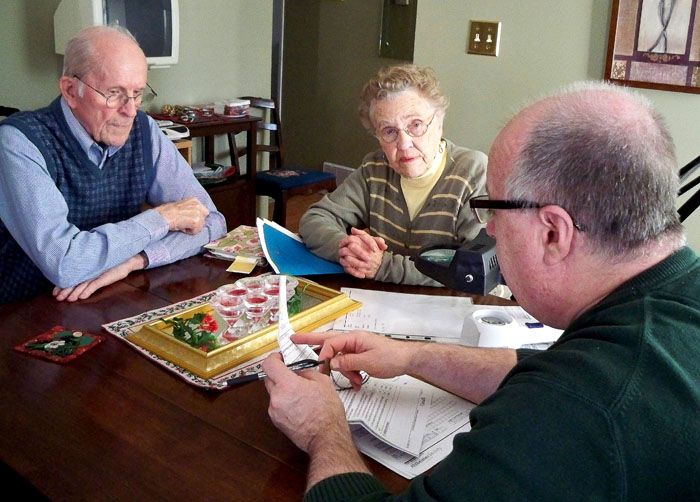Coordinating care for a senior can be a difficult challenge, especially when you are unfamiliar with which resources to turn to. For Winn McLeod, caring for her husband, Cliff, became a bit easier once Edmonton Southside Primary Care Network began providing support.
Cliff, 85, has Parkinson’s Disease. Winn says he has a hard time walking and with his coordination.
“He is getting weaker and weaker by the day. His weight is very bad. He keeps eating but losing weight,” she describes.
Leaving their home of 24 years for any simple errand is also a challenge because Winn, 84, has macular degeneration and can’t drive. They have to rely on a car service run by volunteer drivers and these outings must be booked in advance.
“I used to like getting him out every day to the store, even just for a quart of milk. Now that has to be planned. My daughter does help a lot but she is working. She usually does something with us on the weekends. The grandkids do come over,” says Winn.
Since Cliff’s family physician, Dr. Brian Ritchie, is a member of Edmonton Southside PCN, he has access to services such as a primary care nurse and a geriatric nurse. His nurse, Janice Wall, has been assisting the McLeods apply for DATS transit.
“Janice has been very helpful. She has met him. She has organized things for him. She coordinates everything,” says Winn.
Janice says when she met with the couple, Winn had several concerns about her husband’s care. She realized that they were overwhelmed with Cliff’s health issues and caring for him at home.
Dr. Ritchie referred them to the PCN geriatric nurse, Paul Lord, for extra support and Janice remains in touch with Winn if she needs answers or support.
“I’m trying to link her to resources. With lots of people involved, the team approach for her is perfect,” explains Janice.
Paul visits the couple in their home and answers any questions they may have. He has become the link to the necessary resources for the McLeods, who could be easily isolated because they aren’t able to leave their house freely.
“When Paul comes, you don’t feel like you are on your own,” says Winn. “I feel as though I have someone to phone.”
While Janice will talk to Winn on the phone every few weeks, Paul has visited the McLeods in their home six times since October.
He explains his role as a geriatric nurse is quite different than Janice whose focus is within a clinic.
“We do the cognitive screens and a geriatric assessment. It’s different when they are at home and not at the clinic, they are relaxed. They are in their own environment and the information comes out. They are able to put their thoughts in order and what they want to put across,” says Paul.
He assisted the McLeods fill out a wandering registration form, which is submitted to police in case Cliff leaves the house without Winn knowing. When police have this form, they won’t wait 48 hours to begin the search. They can begin looking for a patient within two to four hours.
Paul also linked the couple with Brendan Klug, an Edmonton Southside PCN geriatric social worker, who helped them create a personal directive and enduring power of attorney.
“Making a personal directive ensures that while you are of sound mind, you have legally named someone to make health-related decisions for you. When the day comes, if it even comes, that you lose decision making capacity you’re saving your family members the hassle of applying to court for a trusteeship or guardianship,” explains Brendan.
He adds the McLeods were happy that the service was free and he was able to go to their house to complete the forms. Traditionally, lawyers charge $500 for each person. Edmonton Southside PCN is the only primary care network in Alberta to offer this service.
Paul says he can try to navigate the system for the McLeods because other health care providers will be aware that Cliff has been assessed by the PCN and a family physician. He’s also aware when patients need to access the proper resources and services.
“If they called into a senior’s clinic for balancing and coordination, it may take a bit longer. Once the services are needed and the quicker you refer them, the quicker you get the service,” he adds.
“Basically, we are linking them to resources in the community and explaining how those resources tie into the patient and what they are hoping to do with them.”
“We’re trying to help them stay in their home. That’s what primary care is all about. It’s just taking care of those needs before they become acute and helping people manage their chronic diseases in their homes,” says Janice.
Dr. Ritchie adds the team approach to help patients like Cliff and support caregivers like Winn does provide better overall care and allows family physicians to focus on their areas of expertise.
